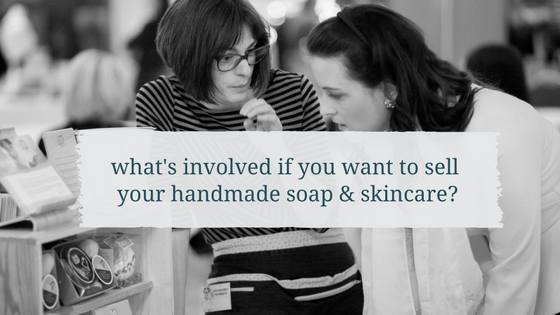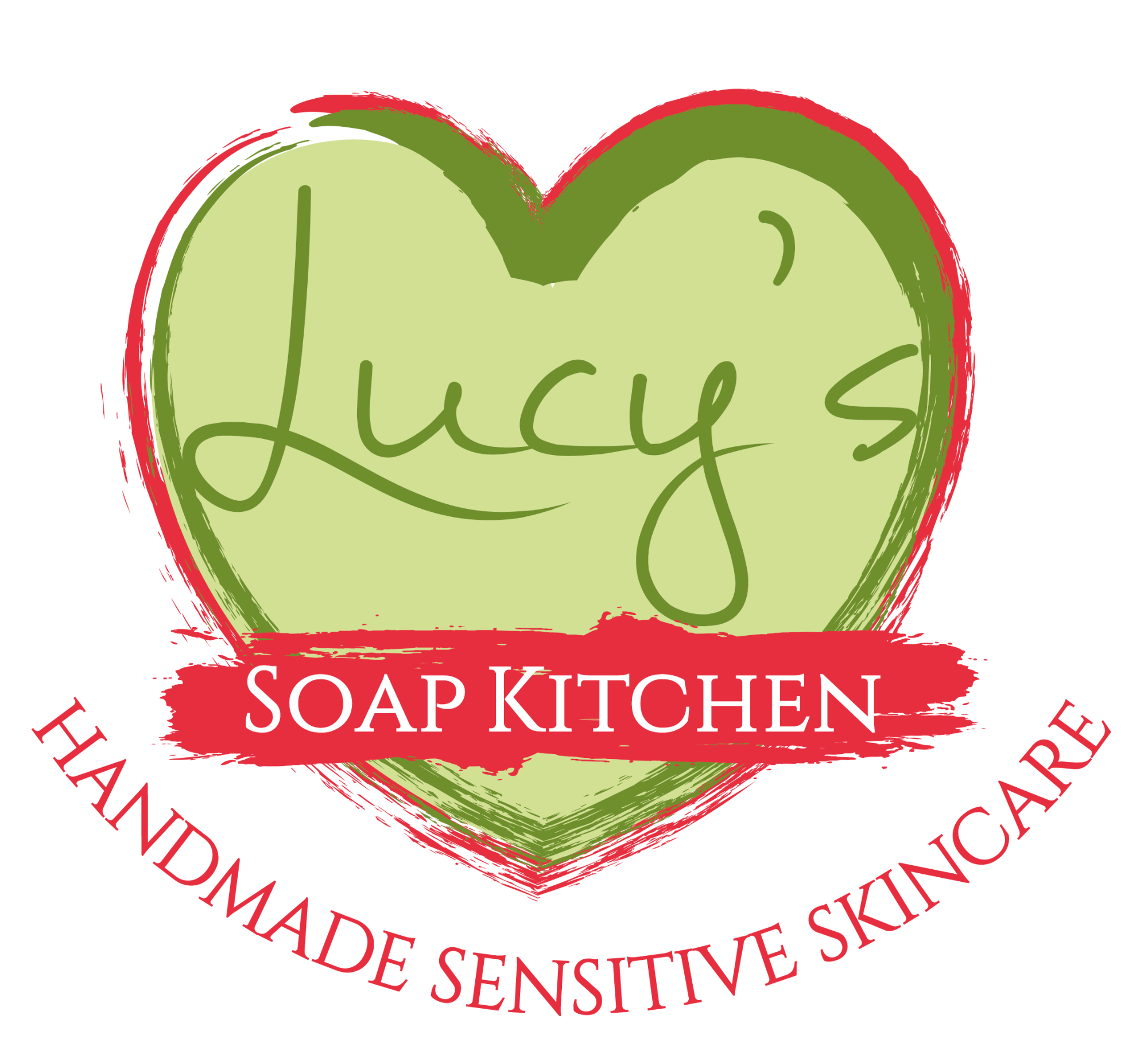Behind the scenes - What's involved if you want to sell your handmade soap & cosmetics?
Posted on

You've been making lovely soap and body butters for a while. Everyone says you should sell it. Can you? What do you need to know and do in order to legally sell your soap (or other skincare) within Ireland and Europe? What about the U.S.? How can you ensure that you are protecting yourself should someone have an allergic reaction to oneof your products?
Over the years selling at and looking around different craft fairs and markets, I've seen lots of soap and cosmetic sellers. There is an increase in makers and sellers as 'green beauty' is currently a fast growing market. Sadly the reality is a large number are not following the legally required E.U regulations and have not safety assessed their products. For those trying hard to comply it can feel so so frustrating. As a savvy consumer what do you need to know to choose your natural beauty skincare wisely?
How can I tell if a soapmaker is legally compliant?
Firstly, turn the product over an check it is labelled properly. All ingredients must be written using their INCI names. For example Shea Buter should be written Butyrospermum Parkii. Having a universal labelling 'language' means ingredients are always transparent no matter the mother tongue. (Seaweed based lotion with essential oils was one of my 'internal rolling of the eyes' moments. This is not an acceptable way of labelling. What's in the lotion? What preservative is being used? Which essential oils? Which allergens are present within the essential oils?)
Sometimes they are not labelled at all. This is only acceptable if there is an ingredients list next to the product at point of sale. If you got a product home and then had an issue with it or had an allergic reaction, without a label how could you identify which ingredient it was?
The address of the responsible person for the product must be on the packaging too so that they are contactable in case of an allergic reaction. As the maker and distributer, I am the repsonsible person for my skincare brand Lucy's Soap Kitchen. My details are on every product.
The product may also be extremely underpriced. The 'hidden' costs unseen by the consumer should effect the price point. The costs of adequate insurances, safety assessments, admin time preparing the necesssary files, labelling, all need to be factored into the cost of the product. Making a product for personal use is significantly lower than making it for public sale.
I want to be compliant, where do I start?
**First a little disclaimer - this guide is not intended as a complete step by step instruction, it is simply an overview to give new soapers and people who buy handmade cosmetics an idea of the work, cost and standard that should be going into their cosmetic products. Please check all the links in my blog post and read the information there yourselves**
E.U. Cosmetic Regulation 1223/2009 has been enforced since July 2013. I will try and break down the basic realities of that regulation
- You must be competent with your product, making for at least a year, so that you have noticed and resolved any issues with your recipes and have been keeping good batch records.
- Your records will need to prove complete traceability of your product. So a record of each batch must be kept, given a batch no, ingredients used listed and their supplier batch codes.
- Each product will need a P.I.F. (Product Information File). Each soap/skincare is a different product and will need a seperate P.I.F. In that P.I.F will be all your G.M.P (good manufacturing process) information, your steps on making the product and also the M.S.D.S for each ingredient used. (you can download these from your supplier)
- Here is a link to Just a Soap's technical blog, I found it fairly well written on these topics, informative, easy to understand and a good starting point
- Once you have decided on your recipe it will need a Cosmetic Safety Report. Personally I use Cosmetic Safety Assesments based in the Uk. They are widely regarded by many to be the best and they are reasonable. Their report is vaild in Ireland and throughout Europe. The last product I submitted for assessment was £215 for one base recipe with 6 varient ingredients. So you see it adds a lot financially to the cost of selling your product. C.S.A have clear guidelines on their website on how to format your product information. (This is only for anhydrous products- NOT using water. If you use water different product testing is required).
- Make sure you are 100% happy with your recipe before you submit it. Once you have your safety report you CANNOT step outside of its restrictions or you will invalidate your liability insurance. (Another 'red herring' is when a maker might say 'Available in the essential oil or fragrance oil of your choice" This is simply not possible).
- Once you have your product safety assessment, ensure your product is labelled properly. As mentioned above the I.N.C.I terms must be used, you must include your (the manufacturer) address,weight, batch number and date of product expiry. Also all of the allergens must be declared on the label (there are currently 26 that must be declared & this number may soon be increasing)
- The product must then be uploaded onto the E.U Cosmetics Portal. (This link also has access to the user guides) C.S.A have a good guide on their website advising how to register and use it. Your product must be uploaded onto this central database, a photograph of the product and also a copy of the label.
- You must hold both public and product liability to sell cosmetics.
- You need to use trade approved (and certified) scales for weighing your final product for sale.
- H.P.R.A are the governing body for cosmetics in Ireland and they have been holding open evenings for cosmetic makers and importerst to ask questions. They have been very helpful and want to support so email or pone for advice if you need it.
- Register with your local section of The H.S.E. They can also come and take a random products away for bacterial testing either from your workshop or from a retailer. This is NOT the same as a safety assessment and is NOT in place of one
Here is a link to the really valuable EU Cosmetic Regulations 2013 Discussion Facebook group for help and advice on the regulations and using the portal.
I wonder sometimes how many hours I have put into all this 'unseen admin' since I started making and especially since the legislation of July 2013. My time has been all the more precious as it was often in the evening, once my small children had (finally) gone to sleep. So to anyone reading this who has ever wondered "why does Lucy charge €5 for a bar of soap?" I hope this in part answers your question!
To all the soapers and cosmetic makers out there who are taking their responsibilities seriously and doing their best to comply, I respect you and wish you every deserved success.
Lucy xx
Here are some more useful links for you
https://www.soapqueen.com/business/understanding-inci-names-on-cosmetic-labels/
http://www.hpra.ie/homepage/cosmetics/regulatory-information/selling-cosmetic-products-in-ireland
https://www.modernsoapmaking.com/follow-the-labeling-rules-and-cosmetics-regulations/
https://formulabotanica.com/how-to-handle-a-fda-inspection/ (this is US based but very useful information)
https://formulabotanica.com/podcast-comply-cosmetics-regulations/
And if you'd like to save this content via pinterest here's a handy graphic I prepared earlier!

Add a comment: